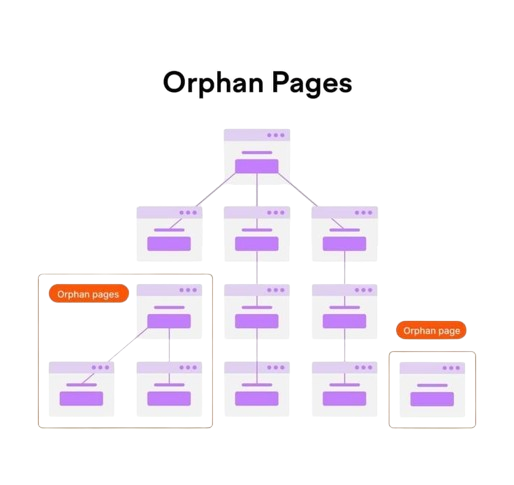If you manage a website, ensuring all your pages are properly linked is crucial for optimal performance and visibility. Pages that exist on your website but aren't linked to from any other page are known as orphan pages. These pages can significantly harm your SEO strategy if left unaddressed. In this article, we’ll discuss what orphan pages are, their impact on SEO, and how to fix them to ensure your website remains search-engine-friendly.
What Are Orphan Pages?
Orphan pages are website pages that are not linked to from any other pages within the same website. This lack of connection makes them virtually invisible to both users and search engines, as there are no internal links pointing to them.
Common Causes of Orphan Pages:
Unlinked Pages: Pages are created but not linked to from menus, other pages, or navigation structures.
Deleted Links: Links to the page were removed during site updates or redesigns.
Broken Links: Links pointing to the orphan page are broken, leading to 404 errors.
Redirection Issues: A page was deleted without redirecting its URL to another relevant page.
Technical Errors: Improper site architecture or CMS misconfigurations can also result in orphan pages.
How Do Orphan Pages Impact SEO?
Orphan pages can negatively affect your website’s SEO in several ways:
1. Indexing Issues
Search engines rely on internal links to discover and index content. Orphan pages lack these links, making them difficult—or impossible—for search engines to find and index. If they’re not indexed, they won’t appear in search engine results.
2. Weak Internal Linking Structure
Internal links help distribute "link juice" across your site, improving the rankings of connected pages. Orphan pages disrupt this structure, leading to poor SEO performance.
3. Reduced User Experience
Users depend on easy navigation to find content. Orphan pages are effectively hidden, making it harder for visitors to locate valuable information. This can lead to higher bounce rates and lost opportunities for engagement.
4. Wasted Crawl Budget
Search engines allocate a limited "crawl budget" to each website. If your site has orphan pages, search engines may waste their crawl budget trying to locate disconnected content, leaving other important pages unindexed.
How to Fix Orphan Pages
If you’ve identified orphan pages on your website, follow these steps to resolve the issue:
1. Identify Orphan Pages
Use tools like Screaming Frog, Ahrefs, or Google Search Console to detect orphan pages. These tools scan your website for pages that aren’t linked internally.
2. Evaluate Each Orphan Page
Decide the purpose of each orphan page:
Delete: If the page is outdated or irrelevant, remove it.
Redirect: Use a 301 redirect to guide users and search engines to a related or updated page.
Link Internally: If the page contains valuable content, add internal links to it from other relevant pages or your main navigation.
3. Optimize Internal Linking
Ensure every page on your website is part of a well-structured internal linking network. Use menus, breadcrumbs, and contextual links to connect all pages effectively.
4. Update Your Sitemap
After addressing orphan pages, update your XML sitemap to reflect the current structure of your website. Submit the updated sitemap to Google through Google Search Console.
5. Perform Regular Audits
Orphan pages can recur due to site changes or updates. Schedule regular audits to monitor your site’s linking structure and address orphan pages promptly.
Conclusion
Orphan pages can quietly undermine your SEO efforts by hiding valuable content from users and search engines. By identifying and fixing orphan pages, you can improve your site’s internal linking, boost crawl efficiency, and enhance the user experience.
If you need help optimizing your website for SEO, reach out to Delemon Technology: 📧 Email: info@delemontechnology.com






Leave a Comment
Share your thoughts on this article